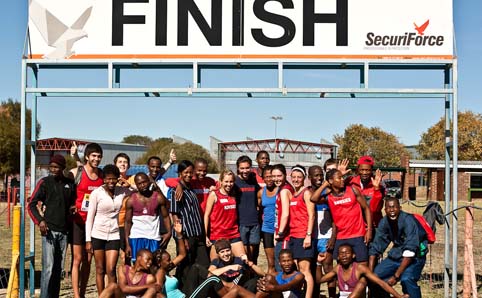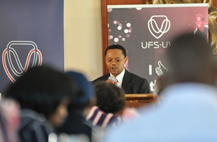Latest News Archive
Please select Category, Year, and then Month to display items
10 March 2022
|
Story Anthony Mthembu
|
Photo Unsplash
 The No Student Hungry team gearing up to start distributing food parcels to the selected students.
The No Student Hungry team gearing up to start distributing food parcels to the selected students.
The UFS is one of the many institutions of higher learning where food insecurity is an active issue. However, the
No Student Hungry Programme is one of the initiatives launched at the university to assist in fighting food insecurity at the institution.
The purpose of the programme
Since its inception in 2011, the initiative has assisted many students in acquiring a healthy meal. Additionally, the Food Environment Office also hands out food packages, so that students can continue to achieve academically. “We are trying to develop a healthy environment for students and make it easier for them to have a nice and healthy meal,” stated Annelize Visagie, who heads the Food Environment Office at the UFS. The Food Environment programme is spread out on all three campuses, each with its own facilitators. Furthermore, the programme mainly caters for students who are not funded by the National Student Financial Aid Scheme (NSFAS) but who are excelling academically. The abovementioned students apply for assistance online, and a list is then drawn up of students who receive assistance for the year.
Alternative solutions to keep the initiative running
On the Bloemfontein Campus, the No Student Hungry Programme will be catering for 200 students in the 2022 academic year, assisting them with a daily nutritious meal. Additional food parcels are also handed out to provide further assistance. “We give food parcels to the students on the list every Tuesday and Thursday at the Thakaneng Bridge,” Visagie highlighted. However, she argues that catering for the student population through this programme can be a challenge, as the demand for assistance is growing rapidly and the ability to assist is limited. The programme relies on partnerships and sponsors to assist the student body. In fact, the coordinators of the programme currently have a memorandum of understanding with Tiger Brands according to which they deliver around 100 food parcels for distribution.
In addition, the coordinators have put in place alternative measures to ensure that they can provide more food to students. “The
Kovsie Act Office, in partnership with the
Department of Sustainable Food Systems and Development, has started a food garden where healthy and nutritious produce are grown, in order to add value to the distribution,” she indicated. Although the programme can only assist to a point, students who are in desperate need of assistance are never turned away. In fact, the
Social Support Unit at Thakaneng Bridge usually assists students with food vouchers for a maximum of four days.
A commitment to teaching healthy eating habits
The programme is not only committed to curbing food insecurity, but also to ensuring that students have a healthy and balanced diet. As such, a booklet is being issued by the
Department of Nutrition and Dietetics in collaboration with the Department of Sustainable Food Systems and Development, which contains ways in which students can make a healthy meal using some of the ingredients offered in the food parcels.
“We want to teach students how to eat healthy in the cheapest way, because they don’t have a lot of money to buy expensive food products,” Visagie argued.
Intravarsity brings Kovsie Campuses together
2012-05-09
 |
|
Bloemfontein and Qwaqwa Campuses find each other in sport, arts and culture.
|
|
Intravarsity Photo Gallery
|
|
Intravarsity
Two campuses, one university, students coming together for a weekend filled with sport, arts and culture. That was the backdrop to Intravarsity 2012, which was held at the University of the Free State (UFS) on 4 and 5 May 2012.
Students from the Bloemfontein and Qwaqwa Campuses came together on the Main Campus to compete in soccer, netball, cross-country, basketball, debating and chess.
The Qwaqwa Campus raked up victories in soccer with their men’s and women’s teams beating their Bloemfontein counterparts. The women’s team won 3-2, while the men triumphed with 1-0.
Bloemfontein Campus beat Qwaqwa Campus 34-12 in netball, 2-0 in chess and 36-34 in basketball.
However, Intravarsity is not just about sport. Students from the two campuses also engaged in art, cultural and leadership events. These events included a musical festival with top local DJs and a leadership breakfast attended by the student leadership from both campuses.
Talking at the leadership breakfast, Prof. Kwandiwe Kondlo, Head of the Centre for Africa Studies, urged student leaders to strive for selfless leadership. “We want our student leaders to be better leaders than we are. Perhaps at one moment some of you may end up leading this country. I hope when your time comes you will save South Africa from the democratisation of shamelessness and corruption, which has gained the upper hand.”
Mr Rudi Buys, Dean of Student Affairs, told the student leaders that the institution was in crisis five years ago. “Today our campuses are together. I hope the significance of the weekend is not lost.”
Intravarsity 2012 replaced this year’s Intervarsity. The annual Intervarsity between the UFS and North-West University (NWU) has been postponed to 2013.
|
Kovsie student leaders discuss leadership at Intravarsity
 Student leaders from the Bloemfontein and Qwaqwa Campuses attended a leadership breakfast during the Intravarsity weekend of 4 and 5 May 2012. The breakfast, held on the Main Campus, was hosted by the Division: Student Affairs. Student leaders from the Bloemfontein and Qwaqwa Campuses attended a leadership breakfast during the Intravarsity weekend of 4 and 5 May 2012. The breakfast, held on the Main Campus, was hosted by the Division: Student Affairs.
Taking lessons in leadership from Prof. Kwandiwe Kondlo, Head of the Centre for Africa Studies, the Kovsie student leaders discussed the duties and responsibilities of leadership, not only on our campuses but also throughout the country.
Highlighting the role of student leadership Prof. Kondlo told students they needed to be active partners in building a cohesive and united university.
“Student leadership is important in the life of any university; it creates conditions the university requires for the construction and production of knowledge. This is very important; hence cooperation between student leadership and management is so vital.”
Prof. Kwandiwe Kondlo’s speech that he delivered at the leadership breakfast. (pdf format)
|